Dr. Bowdish speaks about the role of the microbiome in inflammation and healthy/unhealthy aging (starting at 26:02). Other speakers include Dr. Luigi Ferrucci from the NIH Institute of Aging and Dr. James Kirkland who speaks about clinical trials testing senolytics.
Author Archives: Dr. Dawn M. E. Bowdish
Why does the public mistrust science? Radio interview with CHML.
Dr Bowdish talks to Scott Thompson on CHML radio about a recent survey suggesting that more Canadians have lost their trust in science. Are scientists elitist? What can scientists do to regain the public’s trust ? Listen to this clip to hear more….

Available position: Research Technician in Mouse Models of Aging
This CIHR funded 12 month technician position will study how the immune system changes with age using mouse models. This position is suitable for someone with an MSc or strong experience in mouse models or immunology. The successful applicant will handle mouse breeding and inventory, liaising with animal care technicians to deal with health issues, ordering reagents for lab members, maintaining financial records, enforcing safety regulations and maintaining lab inventories. Research responsibilities will include working independently to perform studies of how the immune system changes with age and will include tissue collection, metabolic and behavioural testing, and creating bone marrow chimeras. This is a limited term contract but pending successful performance reviews it may be possible to extend the contract.
Essential skills
Animal handling
• This project requires significant experience in animal handling including breeding, non-terminal blood collection, anesthesia, tissue collection and procedures such as tail vein and intraperitoneal injections. Experience in behavioural testing, metabolic testing or flow cytometry would be assets. The applicant will be expected to work independently and be able to perform experiments with minimal guidance and to train junior members of the team in basic procedures. Please provide a detailed description of relevant animal experience and training in your cover letter.
Organization and Communication
• The applicant will be required to coordinate experiments with other team members and collaborators weeks to months in advance and consequently excellent organizational skills are required. The applicant will need to work closely with animal care staff and make good judgement calls on issues of animal welfare. The applicant must be able to document results in a laboratory notebook and will be responsible for writing protocols. Excellent written and oral English skills are essential.
Must be willing to learn:
Immunology assays
• The applicant will need to perform ELISAs including multiplex ELISAs (e.g. Luminex), flow cytometry and PCR for genotyping.
Statistics
• The applicant will need to use Graphpad for data analysis and will need to know how to use statistical techniques such as ANOVA.
Additional skills which may be an asset:
Chimeric bone marrow transplants
• The applicant will create bone marrow chimeras. Previous experience in this or other mouse immunology techniques will be an asset.
Behavioural testing
• Experience in studying mouse behavior including anxiety, cognition, and mobility would be strong assets.
Metabolic studies.
• Experience in measuring blood glucose and insulin would be valuable.
Please describe your experience with any of these techniques in your cover letter.
Why the Bowdish lab?
Our lab’s core values are Diversity, Ambition, Innovation and Collaboration. These core values dictate our approach to doing science. Our technical staff are valuable members of our team who participate in our research by performing exemplary work, attending conferences, presenting their work, and communicating with the broader scientific and lay audience. We teach transferable skills that have broad utility within and outside of academia and provide opportunities for personal and professional growth. We value diversity and are family friendly. For more details on our lab see our website.
Postdoctoral fellow position in Aging & Immunity available
This CIHR funded PDF position will study how aging, and specifically age-associated inflammation alters myeloid cell development and macrophage function. This will include performing flow cytometry assays to quantitate development and maturation of myeloid cells in human blood and depending on the applicant’s interest and aptitude may include animal models. The successful applicant will be expected to develop a research project including all required experimental optimization, liaise with collaborators and research participants from multiple sights and write manuscripts to communicate research findings. The applicant must have a background in immunology and be a team player who is willing to mentor junior trainees and be an active participant in departmental seminars and events.
Essential skills
Flow cytometry
• This project requires significant skills in flow cytometry. Although most of the work will be done in human blood, expertise in mouse models would also be an asset. Please include details of your flow cytometry experience in your cover letter and be prepared to discuss the details of protocol development, trouble shooting and optimization if you are chosen for an interview.
Communication
• The applicant will be required to work closely with our research participants, including obtaining consent and filling out detailed health questionnaires. This will require the ability to describe the research in lay terms and to work with older adults who may have issues with hearing and site. The applicant will also be required to liaise with research co-ordinators from multiple sites to facilitate shipments and answer technical questions. Excellent English skills are essential.
• The applicant will be expected to present research findings to the lay public, research coordinators, nurses and PIs and will need experience speaking to broad audiences. The applicant will be responsible for publishing manuscripts. Please describe your oral and written communication skills as well as your publication history (published and in preparation) in your cover letter.
Must be willing to learn:
Phlebotomy
• This successful applicant must be willing to take a phlebotomy course and take blood from our research participants.
BSL2 level blood processing
• The applicant will be handling human blood, including blood that may be infected with viruses and consequently will need to be committed to following sterile and safe practices.
GLP procedures
• All our human immunology work is performed in a GLP compliant laboratory and the successful applicant must be willing to work with all the required GLP procedures.
Immunology assays
• The applicant will perform ELISAs including multiplex ELISAs (e.g. Luminex).
Statistics/R programming language/Data visualization
• Analysis of complex datasets (e.g. multilinear regression) and the R programming language is essential.
Additional skills which may be an asset:
Animal models (e.g. chimeric bone marrow transplants)
• There will be opportunities to test hypotheses and models using the Preclinical Studies in Aging Laboratory (PSAL: www.psal.ca), Canada’s only aging mouse colony. Specifically, there are opportunities to study how the aging microenvironment alters myeloid development by performing heterochronic bone marrow chimeras.
Immunosenescence/Senescence
• Experience in immunosenescence (mice and humans) would be a strong asset.
Microbiome analysis
• Opportunities exist to collaborate on projects on how the aging immune system alters the upper respiratory tract and gut microbiota. Experience with analysis of 16s rRNA sequencing, statistics and large dataset visualization would be an asset.
Please describe your experience with any of these techniques in your cover letter.
Why the Bowdish lab?
Our lab’s core values are Diversity, Ambition, Innovation and Collaboration. These core values dictate our approach to doing science. We support our trainees career development for careers both inside and outside of academia and this project will provide skills that will be broadly desirable no matter what the career trajectory. The Bowdish lab supports scientists with families and diverse backgrounds (see our lab’s diversity statement at http://www.bowdish.ca/lab/lab-philosophy).
If you are interested in applying contact Dr. Bowdish at bowdish@mcmaster.ca. Please include a coverletter detailing your research interests ambitions and relevant skills and a c.v. that includes your publications and references.
How to collect Nasosorp secretions with a pledget
Below is a video that shows you how to place a Nasorp pledget in your nost to create nasal secretions.
Publication: Is Lung Health Good Health For Older Adults?
Bowdish lab undergraduates present their work and bring home gold and silver awards!
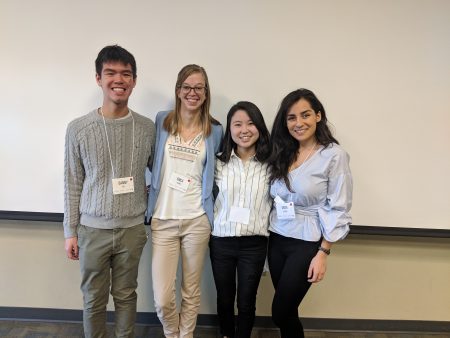
Danny Ma, Erica deJong, Melodie Kim and Mina Sadeghi presented their work at the MIRA-Labarge Research day.
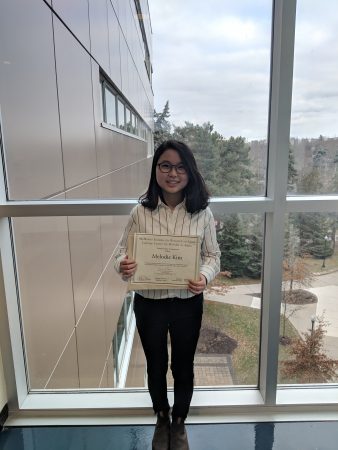
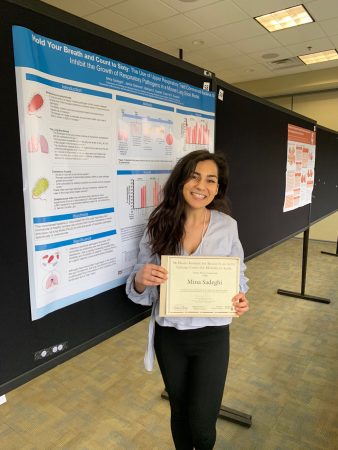
Mina, a winner of a summer scholarship from the McMaster Institute of Research on Aging, wins gold for her poster presentation.
Alumni update: Alicja Puchta, PhD discusses how her time in the Bowdish lab prepared her for a career in law
Alicja Puchta was the first PhD student to graduate from the Bowdish lab. She’s gone on to a career in law. Read all about how her PhD training prepared her for her current career here.
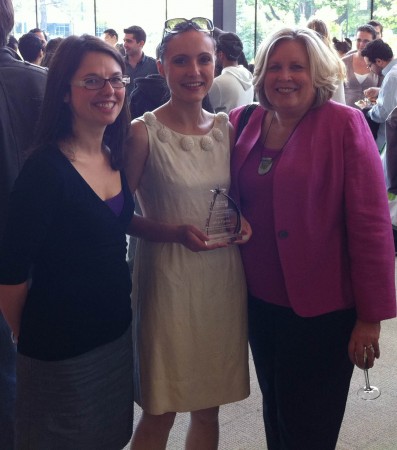
Alicja Puchta recognized for her contributions to teaching. D. Bowdish, Alicja Puchta and Catherine Hayward, Dean of Graduate Studies.
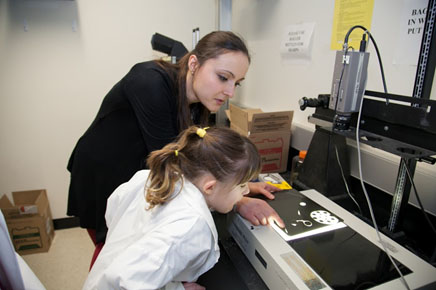
Alicja teaches the next generation of scientists at a Canadian Association of Girls in Science event.
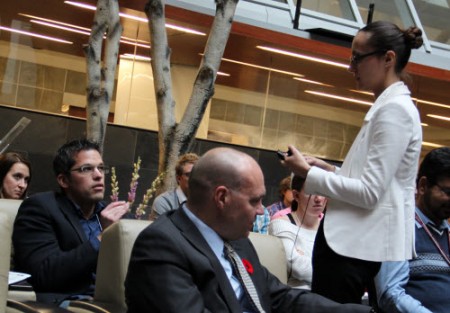
Alicja Puchta makes Dr. Brian Coombes repeat the question after her (very professional, very well received) talk.
Thinking about applying to the Bowdish lab for a summer or 2019/20 thesis position? Read this first
On average Dr. Bowdish receives 100+ applications for 1-2 thesis positions. Currently all 2019/20 thesis positions are filled and Dr. Bowdish will only entertain exceptional candidates who are eligible to apply for NSERC-USRA or other scholarships. Before applying please be aware that…
- Positions in the Bowdish lab are best suited to students seeking a career in research and consequently Dr. Bowdish does not provide reference letters for medical school.
- Please read the FAQ page before applying. http://www.bowdish.ca/lab/faq/
November is Lung Month – what do older adults need to know about pneumonia?
Dr Bowdish is the Canadian Lung Association’s spokesperson for World Pneumonia Day (November 12, 2018). Here she discusses the importance of being vaccinated for pneumonia….
She also speaks to Zoomer Magazine about pneumonia, vaccinations and the aging immune system here…
To get a sense of the other lung research going on in the Bowdish lab, see our Instagram page: house.macrophage
>

